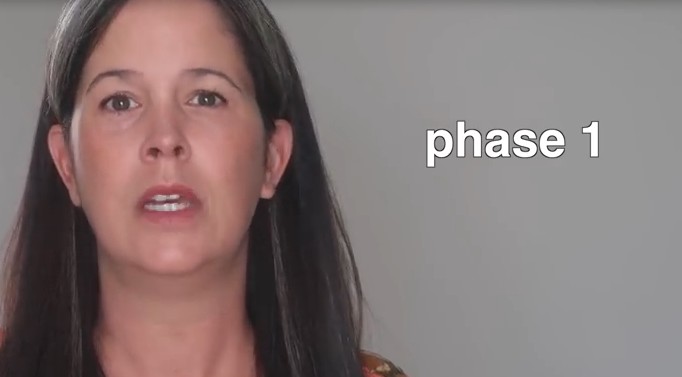You’re learning a lot about American English pronunciation.
你学到了很多关于美式英语发音的知识。
How Americans talk and how to sound American.
美国人怎么说话,怎么听起来像美国人。
And as you’ve learned, you’ve started to become aware of all of your English habits that you’d like to change.
正如你所学到的,你已经开始了解到你有待改变的所有不好的英语习惯。
You start to become incredibly frustrated.
你开始变得非常沮丧。
It feels impossible to take what you’re learning about pronunciation
把你学到的关于发音的知识
and apply it to actual real conversations that you’re having.
应用到你现实生活中的实际对话里面,感觉有些不太可能。
In this video, we’re going to talk about the process
在这段视频中,我们将谈论一个过程,
that takes you from knowing something to being able to do it regularly without even having to think about it.
这个过程就是从你了解一些东西到不假思索地熟练应用它们。
As I’ve been raising my son who’s two, I have noticed lots of little things
在我抚养自己两岁的儿子的过程中,我注意到了很多小的方面,
that made me think about teaching my adult students and accent training.
这些方面使我对成年学生教学和语音训练产生了新的思考。
One of the things that’s so different about pronunciation training is that
发音训练的一个特殊之处就是
it’s different for most of the learning we do as adults.
对于我们成年人所做的大多数学习来说,发音训练与众不同。
When you were learning English, you were likely learning it as knowledge for the mind,
当你学习英语时,你很可能是把它作为大脑的知识来学习,
which is what almost all of the learning we do as older children and adults is, at least here in the US.
这基本上就就是大一点的孩子和成年人的学习状态,至少在美国是这样。
We’re learning things to know, like memorizing vocabulary or English verb conjugations.
我们在学着认识事物,比如记忆词汇或英语动词变化。
Things that you can write and talk about.
你可以书写或者与人谈论这些事物。
Training in a sport or on a musical instrument or singing
运动训练、乐器训练或歌唱训练更像是在练习你的语音,
is a lot more like working on your accent than studying English is.
不像是学习英语。
Some people think I’m an English teacher. I correct them.
有些人认为我是英语老师。我就会纠正他们。
I’m not. That’s not how I think about myself at all. I’m primarily an accent trainer.
我其实不是英语老师。这根本不是我对自己的看法。我首先是一名语音训练师。
I try to figure out how to help students understand
我努力想办法帮助学生理解
and change their habits to be more comfortable and confident speaking English.
和改变他们的发音习惯,使他们在说英语时更加自然和自信。
A while ago, I was reading a book about raising kids
不久前,我读了一本关于养育孩子的书,
that really reminded me of the different phases of learning when working on your accent.
这本书真的让我想起了学习语音的不同阶段。
I talked through this same sequence all the time with my adult students.
我和我的成年学生一直在讨论这个相同的学习顺序。
And you know what the book was about? It was about potty training. That’s right.
你知道那本书是关于什么的吗?是关于宝宝如厕训练的。没错。
This is where Stoney was learning something totally new about his body
斯通尼通过如厕训练对他自己的身体有了全新的了解,
and I had to try to understand his experience, to help guide him through it.
我不得不试着理解他的学习经历,帮助他成功地自主上厕所。
The book said this: the first phase is diapers.
书中说:第一阶段是尿布。
From newborn until it starts to become something that he notices or we start talking about.
从新生儿开始到他开始注意到或者我们开始谈论尿布。
Think of a newborn. Total unawareness about something like peeing.
想想一个新生儿。对小便之类的事情完全不懂。
This is phase one. As he moves out of diapers he has to start noticing something about his body
这是第一阶段。当他脱下尿布时,他会开始注意到他的身体上
that he hadn’t paid attention to before.
一些他以前没有注意到的东西。
This is phase two. This isn’t just like my adult students working on their accent
这是第二阶段。这与我的学生努力练习语音
and being easily understood when speaking.
并在说话时变得容易被理解是不同的。
You’re starting to notice something about your body, the way that you sound,
你开始注意到以前从未在意的自己的身体和声音,
that you hadn’t necessarily paid attention to before or even known how to pay attention to.
你甚至可能根本不知道如何注意这些方面。
The book talked about how first, Stoney will notice after he’s peed. He’ll be able to say: I peed.
这本书谈到,首先,斯通尼在小便后会注意到自己尿湿了。之后他会说:我尿了。
Of course that’s disappointing if your goal is not to have your kid pee his pants.
当然,如果你的目标是不让你的孩子尿裤子,你当然会有点失望。
But it’s a necessary step in this process.
但这是如厕训练过程中必要的一步。
This is not a habit yet. He’s still understanding what’s happening. This is phase two.
这还没有成为他的一种习惯。他还在努力理解发生了什么。这是第二阶段。
He no longer has total unawareness, he now has awareness when something has happened.
他不再完全对尿尿没有意识,他现在已经意识到发生了什么事。
Phase three is being able to tell me when he’s peeing as it’s actually happening. So phase two is past.
第三阶段是当他正在小便的时候告诉我这件事。所以第二阶段已经过去了。
You notice it after it happens. Phase three is present.
在事情发生后你会注意到它。目前处于第三阶段。
You notice it as you do it. Phase four, you may have been able to guess, is future.
当你这样做的时候,你会注意到它。你可能已经猜到了,第四阶段是未来。
You think about it just before it happens.
你会在它发生之前好好考虑一下。
This is the phase he’s in now, thankfully, where he can say: I’m going to pee, or I need to pee.
谢天谢地,这是他现在所处的阶段,在这个阶段,他会说:我要小便了,或者我需要去小便了。
That’s a lot easier to deal with than: I peed or I’m peeing. And there’s a fifth phase.
这就比他说“我小便了或者我在小便”要更容易应对了。还有第五阶段。
That’s the phase where he doesn’t tell us anymore.
在这个阶段他不会再跟我们说他要小便之类的话了。
It’s just part of normal life and he goes to the bathroom when he needs to.
小便成为了他正常生活的一部分,当他需要小便的时候,他自己会去洗手间上厕所。
Let’s talk about these phases with changing a pronunciation habit.
让我们再用改变发音习惯来讨论一下这些阶段。
Phase 1, total unawareness. You’ve never known about the sounds of American English or what you were doing wrong.
第一阶段,完全不懂。你根本不懂美式英语发音或者自己哪个地方说错了。
You’ve learned English but you’ve never specifically studied pronunciation.
你学过英语,但从来没有专门学习过英语发音。

So when you first start studying, you learn all kinds of new things,
所以,当你第一次开始学习英语发音的时候,你会学到各种各样的新东西,
like exactly how the AH vowel sounds that it’s not in your language and how it’s made.
比如AH元音在你的母语中不存在,那么AH元音发出来是什么声音以及AH元音是如何发音的。
That’s something you learn with the mind and that’s very satisfying.
这是你用大脑学到的东西,而且非常令人满意。
You could describe it and teach it to someone else.
你可以通过描述你学到的东西,然后教给别人。
As I said, this is the kind of learning most of us do as adults.
就像我说的,这是我们大多数人成年后的学习过程。
It’s moving from phase 1 to phase 2, total unawareness to understanding.
这个过程正在从第一阶段进入第二阶段,从完全不懂到逐渐理解。
But there are still three more transitions to make before making something a habit
但在养成习惯之前,还有三个转变要做,
and this is where many of my students get frustrated.
这也是我的许多学生感到沮丧的地方。
They’re stuck in Phase two, and that is you know you’re doing it wrong because you learned about it,
他们被困在第二阶段,也就是说,你知道你的发音不对,因为你已经学过了发音知识,
you notice it, but you notice you’re still constantly doing it wrong in conversation.
你注意到了,但你发现你在对话中仍然不断地读错单词。











